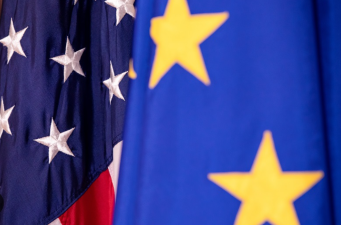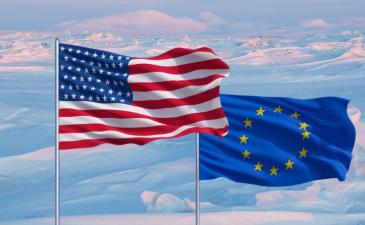
At the end of July 2025, the European Union and the United States announced a framework trade agreement aimed at strengthening economic cooperation and resolving trade disputes. In a joint statement released on August 21, the EU pledged to work to reduce the administrative burden on US companies in the context of the Corporate Sustainability Due Diligence Directive (CSDDD). This commitment has attracted widespread attention as it not only addresses trade policy but also touches on core issues of sustainable development and environmental protection.
EU Efforts to Simplify Sustainability Laws
- Background and Objectives
In recent years, the EU has been working to simplify its sustainability laws to reduce the administrative burden on businesses. In February 2025, the European Commission proposed a comprehensive bill aimed at reducing the number of companies subject to the CSDDD and adjusting related regulations. This bill reflects the EU's efforts to balance economic development and environmental protection.
- Specific Measures
- Reducing the Number of Subject Companies: The comprehensive bill proposes reducing the number of companies subject to the CSDDD, particularly smaller companies with limited resources.
- Delayed Reporting: The European Parliament and the European Council reached an agreement to postpone the reporting deadlines for the next batch of CSRD-reporting companies and the first batch of CSDDD-reporting companies until 2028. This provides companies with more time to adapt to the new regulatory requirements.
- Increased Flexibility: The EU pledged to provide US companies with additional flexibility regarding CBAM to reduce trade friction.

About Changes to the EU's Coordinated Liability System
- Changes
The joint statement stated that the EU will abolish the existing coordinated liability system and instead allow member states to independently handle lawsuits for violations of the CSDDD or CSRD. This change means that if companies violate the relevant regulations, the relevant lawsuits will be handled by the legal systems of individual EU countries, rather than by EU coordination.
- Possible Impact
Impact on Victims: Some critics believe that this change may make it more difficult for victims to bring lawsuits due to differences in legal systems and litigation procedures across countries.
Impact on Businesses: Companies may face different national legal requirements, which increases compliance complexity, but also provides countries with greater flexibility to develop laws tailored to their national circumstances.
EU Assessment of US Production of Relevant Goods
- Assessment Results
In the trade agreement, the EU acknowledged that the production of relevant goods in the United States poses a negligible risk to global deforestation and pledged to ensure that the Deforestation Regulation (DR) does not unduly impact US-EU trade. This assessment facilitates access to the EU market for US agricultural and industrial products.
- Significance
- Reducing Trade Barriers:
This assessment will help reduce trade barriers arising from environmental regulations and promote trade between the US and the EU.
- Enhancing Cooperation:
By recognizing US environmental efforts, EU-US cooperation on sustainable development is expected to be strengthened.
EU Commission Clarifications and Controversies
- EU Commission Position
In its Q&A, the European Commission clarified that this cooperation will not result in any changes to EU domestic rules or grant US companies more favorable treatment under this or any other EU regulation. This position emphasizes the EU's commitment to upholding its own legal system and environmental protection objectives.
- Controversy and Criticism
- Concerns about the Sustainability Agenda:
Richard Gardiner, interim head of EU policy at ShareAction, a UK-based advocacy group for responsible investment, said the joint statement appears to indicate the EU is abandoning core pillars of its sustainability agenda for short-term concessions. He argues that embedding CSDDD/CSRD commitments in trade agreements could lock in deregulation for years to come, making a return to stronger sustainability standards virtually impossible.
- Questions about Long-Term Impact:
Some environmental organizations and experts have questioned the EU's approach, fearing it could negatively impact the EU's long-term sustainable development goals.

US Concerns and Response
- US Concerns
Concerns about Non-Tariff Barriers: US lawmakers and businesses have expressed concern about the CSDDD, believing it could become a non-tariff barrier for US companies entering the EU market. French Hill, chairman of the US House Financial Services Committee, stated in February 2025 that the CSDDD should be considered a "non-tariff barrier" for US companies.
Trade Policy Adjustments: In March, the US Senate introduced a bill that would prohibit US companies from complying with these laws. In addition, the Office of the United States Trade Representative (USTR) criticized several EU laws in April, arguing that the CBAM could undermine the competitive advantage of US exporters in the EU market and impact US$4.7 billion in annual US exports.
- Attitudes of US Businesses
ExxonMobil's Criticism: In a June 2025 interview, ExxonMobil CEO Darren Woods described the CSDDD as "the worst legislation in the world" he had ever seen and called on the Trump administration to address it as part of its trade policy.
Industry Pressure: The US energy industry and other related businesses have strongly opposed the EU's sustainability regulations, arguing that they could increase operating costs and undermine their competitiveness in the EU market.
EU Commitment to Purchase US Energy Products and the Controversy It Has Resulted from
- Commitment Content
The trade agreement also includes the EU's commitment to purchase US liquefied natural gas, oil, and nuclear energy products, with an estimated value of US$750 billion by 2028. This commitment is seen as EU support for the US energy market and aimed at strengthening bilateral cooperation in the energy sector.
- Controversy
Criticism from Environmental Organizations:
The European Environment Bureau (EEB) criticized the commitment, arguing it would undermine the EU's medium-term decarbonization goals. It called on the European Parliament and member states to review and reject any agreement that undermines Europe's climate goals, energy sovereignty, or international credibility.
Impact on EU Climate Goals:
Some environmental experts point out that large-scale purchases of US fossil fuels could negatively impact the EU's decarbonization progress and undermine its efforts to combat climate change.
Future Outlook: Striving for a Balance between Economic Cooperation and Environmental Protection
The adjustments to the CSDDD and related regulations within the framework of the EU-US trade agreement demonstrate the complex balance between promoting trade and promoting sustainable development. While the EU's measures aim to reduce administrative burdens on US businesses, the process has also raised concerns about potential impacts on environmental protection and sustainable development goals. Concerns from US businesses about EU regulations and criticism from environmental organizations about potential EU deregulation highlight the importance of striking a balance between economic cooperation and environmental protection. Going forward, both sides must continue to explore ways to ensure the coordinated advancement of economic interests and environmental goals through cooperation. This requires not only the wisdom and foresight of policymakers, but also the joint efforts of businesses, environmental organizations and the public to achieve the long-term goal of sustainable development.
